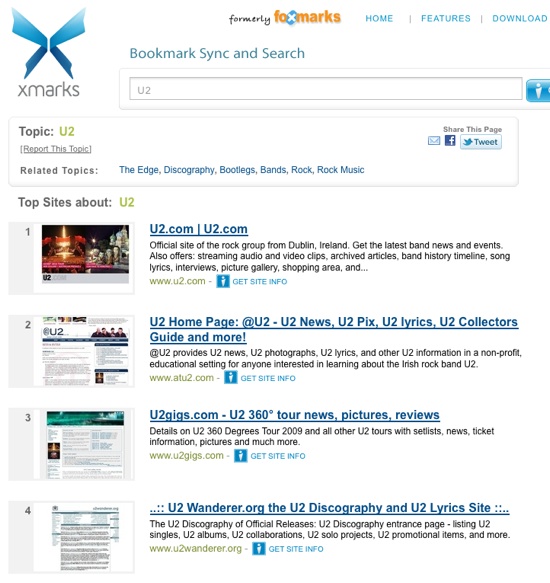Xmarks Shuts Down After Failing To Sell Its Search Engine
Xmarks, the popular browser bookmark synchronization service, is going to shut down on January 10, 2011. Xmarks is a free service that saves your bookmarks across different browsers and different computers, and currently boasts about two million users. I’m a longtime user and fan of the service, going back to when it was called Foxmarks; […]

In his blog post announcing the decision, co-founder Todd Agulnick explains how, inspired by the crowd-sourced success of Wikipedia, Xmarks was inspired in 2006 to aggregate its users’ vast database of bookmarked web pages into something useful — “maybe even a spam-free search engine based entirely on what users had bookmarked.”
Later, as the service neared 100 million bookmarks, the company did exactly that.
The first thing we built was a search engine. It turned out amazing results, but only for certain types of queries. It was terrible at finding facts. But if you were looking for the websites in a particular category, the results were shockingly complete and entirely spam-free. Looking for the list of all auto manufacturers? Or presidential libraries? Or art supply sites? A casual comparison of our results with those of the major search engines would convince you that we were on to something. We recruited a group of non-technical subjects to do a usability test, and it flopped. Sit people in front of a search box and ask them to test it, and their first query is their own name. #FAIL. It turns out that with the exception of people doing market research, consumers using search are not typically looking for an authoritative list of sites within a category; they’re looking for an answer to a specific question.
If you’ve been in SEO long enough, you can probably identify with the final sentence there. The best-known directories, like DMOZ.org or the Yahoo Directory, have always been valued more for the (assumed) benefit of their links than for any actual traffic they generate.
Xmarks is, to a large degree, more like a Yahoo Directory or a DMOZ than like a true search engine; it’s a huge database of web sites and web pages bookmarked by its users. And the current “bookmark search” tool it offers is quite good. These results for U2 are astonishingly accurate in terms of showing the most well-known, authoritative sites — official and independent — about the rock band.
In his blog post today, Agulnick says Xmarks has been shopped around since the spring, but after getting “remarkably close” to a deal, the buyer backed out. GigaOM says Xmarks was close to selling to Google, though that’s not been confirmed anywhere as far as I know. Google’s Chrome browser already offers a similar sync feature for bookmarks.
If you’re an Xmarks user, see this page for more information about the service’s shut down, including alternatives. (Sadly, none of them are cross-browser.)
There’s more discussion on Techmeme.
Contributing authors are invited to create content for Search Engine Land and are chosen for their expertise and contribution to the search community. Our contributors work under the oversight of the editorial staff and contributions are checked for quality and relevance to our readers. The opinions they express are their own.
Related stories
